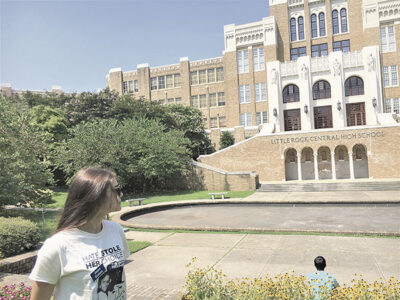Standing up for yourself
A story of integration

Jenna Gumina, a Howland High School student who is part of Mahoning Valley Sojourn to the Past, takes in the enormity of Central High School in Little Rock, Ark. The group traveled to the city Saturday to meet Elizabeth Eckford, one of nine black students who integrated the 4-square-block school in September 1957.
LITTLE ROCK, Ark. — Hearing a presentation from a civil rights icon took Ashlynn Wells back to her kindergarten year when her hairstyle became a source of rejection and long-term damage to her self-confidence — even though she had repressed the memory.
“I wanted to be friends with these two girls. One day on the bus, they told me I couldn’t sit with them because I had curly hair. It affected me until about seventh grade,” Ashlynn, 16, remembered.
On Saturday, she and Mahoning Valley Sojourn to the Past members, along with their California counterparts, met Elizabeth Eckford, 79, one of nine black students who integrated Central High School in September 1957 in the city.
Ashlynn is the granddaughter of Penny Wells, Mahoning Valley STTP’s executive director, and lives in New Jersey.
Eckford’s presentation in the school library touched Ashlynn largely because Eckford had experienced tremendous bullying and rejection while in high school, and like the other eight blacks, was told she would be expelled if she fought or talked back to her tormentors.
Also, Ashlynn was unable to stand up for herself when peers grabbed at her hair that she wore in a bun. Nevertheless, Eckford’s talk reinforced for Ashlynn the value of standing up for oneself, she added.
On what she thought would be her first day of school Sept. 4, 1957, Eckford got off the bus and was greeted by an angry white mob that spewed racial epithets and threats at her; some also threatened to hang her from a tree on the school property. In addition, Eckford had made her own dress for school, but never wore it again because many in the mob had spit on it.
She also was bullied, ignored, shunned and attacked after having been admitted into the school. Acts included being body slammed daily against lockers as well as being scalded in the shower after gym class when her tormentors simultaneously flushed all of the toilets.
Before she spoke, the Sojourn crowd refrained from applauding because sudden loud noises can trigger flashbacks for Eckford, who suffers from post-traumatic stress disorder related to her experiences at the 4-square-block Central High.
Despite the landmark 1954 Brown v. Board of Education U.S. Supreme Court decision, Virgil Blossom, the superintendent, wanted “token integration” and forbade the nine from participating in extracurricular activities, Eckford recalled, noting full desegregation didn’t occur until about 1989.
She also vividly remembered the Arkansas National Guard, with bayonets, preventing her from entering the school in three locations on what would have been her first day.
“That is when I finally realized they were there to keep me out,” she said.
Eckford then tried to enter a corner drugstore before reaching the bus stop, but the owner locked the door and refused her entry, she remembered.
Nevertheless, Eckford’s most painful memories of Central were the majority of her peers who failed to intervene on her behalf, although she also expressed gratitude toward Ken Reinhardt and Ann Williams, two white students who were in her speech class and reached out to her empathetically.
Adding to the black students’ misery was Principal Jess Matthews refused to act unless a teacher witnessed and could verify an act of bullying, Eckford continued.
Eckford, who served five years in the U.S. Army, worked as a probation officer and earned a bachelor’s degree in history from Central State University in Wilberforce, Ohio, cautioned the Sojourn group to be aware of the corrosive effects of derogatory, misogynistic and racist language.
“When you use the ‘N’ word, you’re showing other people you have racial self-hatred,” she said.
Eckford also urged the students to assist peers who are alone and being shunned.
“You could help someone live another day,” she said. “You might be someone’s hope someday.”
Ashlynn, who hopes to become a lawyer, said Eckford has inspired her to create a club at her school to teach nonviolence and to perhaps form a nonviolence parade similar to the annual one in early October in Youngstown.
“I find it inspiring and motivating, and she made me feel I can do anything,” Ashlynn added.
In 1999, Eckford and the other eight black students received the Congressional Gold Medal.


